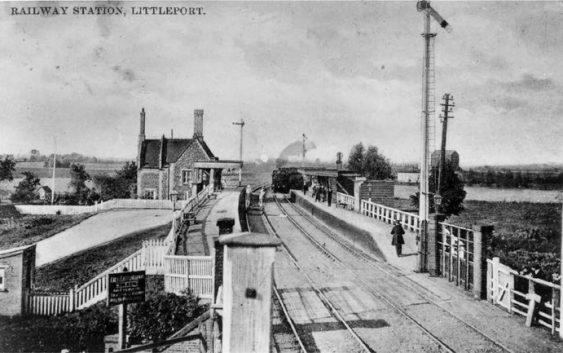This is a true story of a little girl who grew up in the Fens.
When she was born she lived briefly with her mother and grandparents. Their home was a house near the railway line, near Downham Market on the border of Cambridgeshire and Norfolk.
When she was 2 years old went to permanently live with her aunt and uncle who had just got married and had no children. They lived at the side of a drain in the nearby area.
At that time, her Uncle had been in bed with rheumatic fever. It was 18 months before he was able to work again, and it left him with a weak heart. Then the family moved to a drove in Ten Mile Bank, a farm cottage. The cottage was propped up by two props at the back and when she was older she used to cycle to school at Black Horse Drove from there.
‘She had her first pair of glasses at the age of 5 years.’
She had her first pair of glasses at the age of 5 years. The optician’s clinic was at West Fen Road, Ely and to get there it was a cycle ride to Littleport; leaving the cycle in the yard of Hatch’s cycle shop for a small fee, then taking a bus to Ely.
She started school at 6 years old. This was in the back of the chapel at Black Horse Drove, her school teacher was Mrs Murfitt. In 1937 the Coronation School was named after the celebration of George VI’s coronation and the children marched from the chapel to their new premises.
A new teacher was also in attendance, Miss Taylor. This teacher had an assortment of teachers to help her over the years, none staying permanently. The cook was Mrs Annie Thompson who had a free hand to cook what she wanted.
She also went to Sunday school. The teacher there was Mr Cecil Fletcher. Every year a Sunday school anniversary would take place, this was a chance to wear a pretty dress with usually a straw hat decorated with ribbons, white socks and black patent shoes. One year her hat was decorated with green flowers and she remembers getting upset as she was teased that it looked like a lettuce!
‘She also remembers playing at ‘grandad’ Langley’s farm with his daughter Jessie’
She also remembers playing at ‘grandad’ Langley’s farm with his daughter Jessie. The farm was near to where they lived at the time, Ten Mile Bank. They would help themselves to handfuls of cockneydash (an animal food which consisted of grains mixed with a rice type mixture) which was very tasty.
When she was 13 years old, she needed her tonsils removed. Her aunt didn’t want her to go into hospital so it was arranged for the doctor and nurse to come to the family home. Her operation was performed on the kitchen table. It cost 7 guineas. She remembers a tiny drop of ether, which was used as anaesthetic, had dropped on her forehead causing a little blister.
The first time she went to a cinema she was taken by her Uncle Goodrum, sitting on the crossbar of his cycle cushioned with a cushion. Goodrum’s girlfriend also accompanied them. The cinema was halfway down Granary Lane in Littleport, and the film they saw was ‘Can’t help singing’ starring Deanna Durbin.
Cycling was the only form of transport for her family, quite often visiting her uncle’s mother who she called Granny, and who lived just outside of Upwell.
To get to the seaside resort of Hunstanton, cycles would be left at the Railway Tavern, Littleport, and then catching the steam train from Littleport station.
When she moved to Black Horse Drove her neighbours were Becky Barlow and her son Billy, ‘Granny’ Grindling and Annie Thompson the school cook.
During the war around 1940/41 the evacuees arrived in Black Horse Drove. She remembers her grandmother taking in a little girl who was the same age as her, she wasn’t very happy at this at the time. The little girl named Nora had managed to have been rescued from Germany. Her only belongings were a little suitcase containing a little china doll and her clothes. Being a Jew, her family had been murdered.
Later in life she felt ashamed of her feelings back then, Nora stayed with her grandmother for a couple of years, but sadly she doesn’t know what became of her after that. Londoners Iris and Billy Bates went to live with Hilda Underdown, who lived in a double dwelling near the railway line.
‘Later in life she felt ashamed of her feelings back then’
The children went to school with her. On one occasion when she and Iris were then attending the secondary school in Littleport, they were together and late returning to school after the lunch break. The two girls decided rather than get into trouble they would walk home to Black Horse Drove, hoping no-one would notice. It hadn’t gone unnoticed. The next morning when they arrived at school they were both caned in front of the assembled pupils. They didn’t do it again!
‘A curious sight for the people of the Drove was the bomb which had dropped in the garden’
A curious sight for the people of the Drove was the bomb which had dropped in the garden of George and Jessie Wilding (later to become my grandparents) during the war blowing out the windows and doors, and causing damage to the roof too. Luckily no-one was hurt, the Wilding family and the Allen family next door were all given accommodation until the house was repaired.
Two planes also collided around that time, one landed near the railway line, people went to the wreckage and collected perspex which the cockpit was made of, some made rings from it. The silk parachutes were also taken.
Rationing took place during the war, for clothing a docket from the ration book was taken into a shop to enable certain purchases. This also applied to food, one fact is only one banana was allowed for the under 16 year olds. One young man Lewellyn Raby known as Loulou received his banana one day and the next on his 16th birthday he got married! That was the end of his bananas for quite some time!
Mr and Mrs Gotobed owned the shop. There was a large oven in store where they baked bread and it was taken by horse and cart to the residents of the Drove to buy. The couple who usually had this job was Maud Pettengell and Mr Laws. The bread was also sold in the shop.
Jim Firby collected the accumulators (for the radios) and charged them, Mr Kemp took over in later years.
Milk was delivered by Mr Hiblin.
Most people of Black Horse Drove paid into a slate club held in the Black Horse public house. A few pence a week enabled them to pay the doctor if needed as there was no National Health Service. The dentist would come to the school for the children.
Other characters from those days were ‘Uncle’ Sam Fincham; he was everyone’s ‘Uncle’ – he lived next to the shop and he rode a three wheeled bike. Old Dick Nicholas lived at the top of the Drove.
Mr Elliot Crab mended people’s shoes.
At the age of 14 she left school, in fact she left school one week and had a job working in Heygates in Littleport the next. Heygates was a fashionable clothes store with haberdashery and millinery. The owner was Mr Owen Jones. She worked under Mr Robert (Bob) and Ruth Jones the son of the owner. Mrs Jones senior would come into the shop to show the girls how to wrap coats, dresses etc., in a parcel the correct way to prevent creasing. Her workmates were Esme Butcher, Sheila Leggett and Greta Bell. Curtain material was 1⅔ of a coupon a yard. 3½yds would make a dress, you could buy more curtain material than dress material so that became more popular.
The starting weekly wage working Monday to Friday 9am – 5pm and Saturday 9am – 6pm was 10 shillings a week (50p) and rising to £1.10s 0d when she left after a period of 3½ years.
It was a different life to today, growing up in the fens long ago.


I love the local history and would like to hear more. There is so much detail in this account. I am researching nearby village of Ten Mile Bank and would be grateful if anyone has any details from this era.
Hi Steve.
I also have an interest in the area, as my family came from around the area of the Fens. It’s been awhile since I read them but three books may be of interest: Tales from the Fens; More tales from the fens; A fen mans story, all be W.H. Barrett with a fourth book, east Anglian Folklore and other tales jointly written by W.H. Barrett and R.P. Garrod they are long out of print but you could try AbeBooks